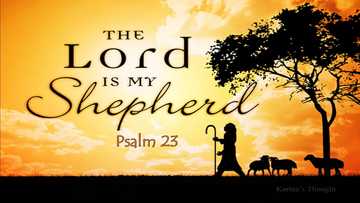Verses about offering in the Bible
There are so many verses that talk about offering in the Bible. An offering is a giving that has no specifications concerning the quantity or value. It all depends on individual willingness from the heart. It can be in the form of money, animals, farm products or time. To learn more about offering in the Bible, check out the following verses from the Bible, which are what Christians follow as their direction on what God desires of them. You will get to learn about offering, why you should give offerings and probably get inspired to get into the habit of giving offerings yourself.

Source: UGC
Giving an offering is a religious obligation that is aimed at pleasing God. Solomon is one of the men in the Old Testament who made the most offerings until God was touched. God appeared to him in a dream and was ready to give him whatever he wanted. It is believed that offerings please God. However, you need to understand what offering to take unto the Lord if you want to be accepted. Get the truth from the Bible itself.
READ ALSO: Bible verses about love and marriage
Burnt offering in the Bible
To explain the burnt offering in the Bible, you need a clear understanding of the five books of The Law especially the book of Leviticus. Although burnt offerings also appear in the book of Genesis and Exodus, the book of Leviticus explains the concept in more details. It was the Lord Himself who gave the specifications to Moses on how the altar for the burnt offering was to be made. The instructions were that it be made of acacia wood. The shape was supposed to be a squire of length five cubits with a height of three cubits. Each of the four corners was to have horns overlaid with bronze.
To get a clear picture of the burnt offering in the book of Leviticus, we need to know some facts about this offering.
- The burnt offering originates from the book of Genesis. Noah was the first person to offer a burnt offering after the floods that God used to destroy humanity (Gen 8:20). When God told Abraham to offer his son as a sacrifice, He Himself provided a lamb which Abraham offered as a burnt offering instead of his son Isaac (Gen 22:2, 13). Also in the book of Exodus, we find Moses insisting to Pharaoh that the Israelites must move with their flock to worship the Lord since they were to offer them as burnt offerings (Exodus 10:25-26).
The burnt offering was the most common type of offering offered during many occasions in the old testament times, often together with another offering or sacrifice. Leviticus 1 highlights how the burnt offering ought to be offered, but we need to know when it should be offered. Looking at other books of the Law, you realize that the burnt offering was made during the following occasions.
- Every morning and evening (Exodus 29:38-42; Num 28:3, 6)
- On every Sabbath (Numbers 28:9-10)
- At the beginning of each month (Numbers 28:11)
- On the 14th day of the 1st month when celebrating the Passover (Numbers 28:16)
- Along with new grain offering at the feast of weeks (Numbers 28: 27)
- During the feast of trumpets.
- On a sacred day in the 7th month (Numbers 29:1)
- During the celebration of the new moon (Numbers 29:6)
The burnt offering was mainly offered in conjunction with other sacrifices such as:
- Guilt offering (Lev 5:7, 10, 17-18),
- Freewill offering (Lev 22:18),
- Sin offering (Lev 5:7; 6:25),
- The sheaf offering (Lev 23:12) and
- The new grain offering (Lev 23:15-22).
During cleansing, one of the sacrifices made was a burnt offering. Some of these instances are:
- A woman after childbearing (Lev 12:6-8),
- Cleansing of a leper (Lev 14:19-20),
- A woman who has an abnormal discharge (Lev 15:30) and
- A man with a discharge (Lev 15:14-15)
The burnt offering was fully consumed at the altar. Unlike the other offerings where the priests or those making the offering had a portion to take, all of the burnt offering burned in the fire, and only the hide was left for the priest (Lev 7:8). The regulations for making this offering adhered to the latter because any violation could result in serious consequences.
Animals recommended for burnt offering included:
- Bulls
- Sheep or goat
- Pigeon.
Leviticus Chapter one outlines the instructions for offering each of the animals. The variation was brought about to accommodate everyone depending on the poverty level. The best animals are to be selected for the offering. Apart from the birds, the flock and the herd were supposed to be males, young and healthy.
The primary purpose of the burnt offering was for the atonement of sins and to seek God's acceptance. The person making the offering lay his hands on the animal to signify that he was identifying his crimes with the animal. When the animal was slaughtered, it died for the sins of the person making the offering.
READ ALSO: Christian names and their meaning
Offering Bible verses

Source: UGC
An offering is one of the religious acts that is emphasized in Christianity. It builds on a believer’s faith. Below are some of the offering Bible verses that will help you understand God's mind about an offering.
- The people rejoiced at the willing response of their leaders, for they had given freely and wholeheartedly to the Lord. David, the king, also enjoyed greatly (1st Chronicles 29:9). This verse comes after the officers, leaders, and commanders in Israel had given willingly towards the work on the temple of God. God acknowledges giving when it is from a cheerful and willing heart.
- Each man should give what he has decided in his heart to give, not reluctantly or under compulsion, for God loves a cheerful giver. These are the words of Paul to the Corinthians.
- In everything I did, I showed you that by this, we must help the weak, remembering the words the Lord Jesus Himself said: ‘it is more blessed to give than to receive'.
READ ALSO: Top trending Elder Mireku praises songs
Scriptures on giving offering
There are many scriptures in the Bible on giving an offering. They seek to address the question of who should provide when to offer, how to give and why should one give. Highlighted below are one verse for each of the four items.
Why should one give an offering?
- Give, and it will be given to you. A good measure, pressed down, shaken together and running over, will be poured into your lap. For with the measure you give, it will be measured to you (Luke 6:38). One of the reasons as to why we should give is that giving automates receiving. Since there is a point in life that each person will need some help, there is reason enough to make us be givers.
How should one give?
- Every man shall give as he is able, according to the blessing of the Lord your God that He has given you (Deuteronomy 16:17). This verse clearly shows that there is no specific limit when it comes to giving. One should give according to what he has, according to his capability.
Who should give?
- And do not forget to do good and to share with others, for with such sacrifices God is pleased (Hebrews 13:16). From this verse, we can conclude that every person who desires to please God should do good to others.
READ ALSO: Pastor drowns in flood in attempt to protect church offering
Offertory scriptures

Source: UGC
- Luke 12:33-34: Sell your possessions and give to the poor. Provide purses for yourselves that will not wear out, a treasure in heaven that will never fail, where no thief comes near and no moth destroys. For where your treasure is, there your heart will be. Offering is a way of connecting with the Lord and making Him happy.
Offering verses for church
For a church to stand, members must learn the concept of making offerings, appreciate it and put it into practice. Teaching on this topic may not be a straightforward task. One ought to be well- equipped with many simple verses that talk about offering. Here are some of the verses that would move the congregation and make them givers.
- One man gives freely, yet gains even more; another one withholds unduly but comes to poverty (Proverbs 11:24). This verse will change the perspective of those who think giving or offering is a waste of money and resource. It will help the church understand that giving cannot make one be poor; instead, it makes one gain even more. At the same time, it cautions them that withhold their property that doing so can lead to poverty.
- Offer the sacrifice of the righteous and trust in the Lord (Psalm 4:5). Righteousness is a must for one's offering to be acceptable in the eyes of the Lord.
- Therefore, I urge you, brothers, in view of God’s mercy, to offer your bodies as living sacrifices, holy and pleasing to God - this is your spiritual act of worship (Romans 12:1). Paul urges the Romans to offer their bodies as living sacrifices because doing so is an act of worship in the spiritual context. The church is called upon to worship the Lord is truth and in spirit since one of the primary reasons why God created human beings is so that they may worship him.
- Honour the Lord with your wealth, with the first fruits of all your crops; then your barns will be filled to overflowing, and your vats will brim over with new wine (Proverbs 3:9-10). It is a requirement for Christians to take their first fruits to the church as an offering to God. Doing so shows respect and honour to God. I turn God promises to bless those who fulfil this obligation with abundant blessings for their harvests.
- “Will a man rob God? Yet you rob me. “But you ask, ‘How do we rob you?’ “In tithes and offerings. You are under a curse-the whole nation of you-because you are robbing me. Bring the whole tithe into the storehouse. Test me in this,” says the Lord Almighty, “and see if I will not throw open the floodgates of heaven and pour out so much blessing that you will not have room enough for it. I will prevent pests from devouring your crops, and the vines in your fields will not cast their fruit,” says the Lord Almighty. “Then all the nations will call you blessed, for yours will be a delightful land,” says the Lord Almighty (Malachi 3:8-12).
What does the Bible say about offerings is a question that many believers ask. This is because the concept of giving has been violated by men and women who purport to be servants of the Lord yet they aim to rob their followers using scriptures. They, therefore, deceive them that offering huge amounts will make them wealthy and all their problems will be solved. The truth of the matter is that giving is an act of worship and God gave man the freedom to choose what to give. There are blessings that come along with giving but that ought not to be the motive of giving an offering. Here are verses from the Bible that teach on how giving should be done.
- As he looked up, Jesus saw the rich putting their gifts into the temple treasury. He also saw a poor widow put in two very small copper coins. “I tell you the truth,” he said, “this poor widow has put in more than all the others. All these people gave their gifts out of their wealth; but she out of her poverty put in all that she had to live on (Luke 1:1-4). This verse portrays that it is not about how much you give but it is about the state of your heart and the cost you have endured to give such an offering. Thus, the amount does not matter to God for he looks at the state of the heart.
- Malachi 3:10 talks about tithe. Tithe means a tenth of what you have. Tithe is the only offering that is quantified, and it is mandatory. The rest are voluntary only that they should be offered with a cheerful heart as Paul the apostle puts it in 2nd Corinthians 9:7
- Now ye Philippians know also, that in the beginning of the gospel, when I departed from Macedonia, no church communicated with me as concerning giving and receiving, but ye only. Philippians 4:15 (KJV)
Offering chapters in the Bible

Source: UGC
The book of Leviticus is one of the books in the Bible that has many chapters that talk entirely about offering. The first seven chapters explain the different types of offerings that the Israelites were supposed to make on various occasions. This is a highlight of the offering each chapter addresses.
- Chapter one explains how the burnt offering was made.
- Chapter two explains the grain offering.
- Chapter three talks about the fellowship offering
- Chapter four is all about the sin offering
- Chapter five is partly about the sin offering and somewhat the guilt offering.
Chapter six talks about three types of offerings
- The burnt offering (Leviticus 6:8-13)
- The grain offering (Leviticus 6:14-23)
- The sin offering (Leviticus 6:24-30)
Chapter seven explains two types of offerings.
- The guilt offering (Leviticus 7:1-10)
- The fellowship offering (Leviticus 7:11-21)
In conclusion, offering in the Bible is a detailed concept that requires one to take a reasonable amount of time to study about it. Having a good understanding of this concept will lead to growth in spiritual matters. It also enhances an individual’s knowledge about God and what he expects from believers concerning giving offering.
READ ALSO: Names of God and their meaning
Source: YEN.com.gh









